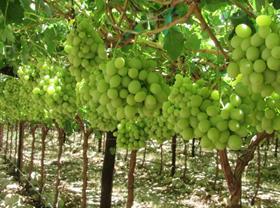
A combination of various factors has hampered early exports of South African table grapes so far this season.
This is likely to affect supplies into the pre-Christmas market in the UK and Europe, a period which has always been very important for the country's exporters.
As things stand now, significant shipments will arrive in early January, a time when both the British and European produce trades will have to adjust to life after Brexit.
The later-than-usual shipments are mainly due to the grapes in the Orange River being almost two weeks later than normal, while there ha also been a delayed start in the northern regions.
The latest shipping information will likely only be available later this week, but sources in the Orange River confirmed that only small volumes would arrive in Europe and the UK in time for pre-Christmas sales.
The matter has been further complicated by rain in the northern regions and isolated showers in the Orange River last week, which briefly halted harvesting and packing.
It normally takes a week for harvesting, packing, cooling and delivery to Cape Town before the grapes can be shipped. The standard sea voyage takes about two weeks.
Figures released by SATI for the period ending week 46 illustrated the impact of the late season.
Week 46 ended in mid-November and at that point shipments to both Europe and the UK were less than half of last year’s.
Only slightly more than 100,000 cartons had been sent compared with around 351,000 the previous year and even more in the previous two years.
At the end of week 46 the Orange River had not even started packing. At that stage the northern regions had delivered less than a third of last year’s deliveries at the same time of the season.
The Orange River has, since then, seen harvesting pick up significantly, and disruption by unseasonal rain last week came as an unwelcome event.
SATI’s forecast for the campaign still predicts a total crop of between 65m and 69.8m cartons for the season. There is still a long season ahead and the regional diversity in South Africa tend to make up for possible early lags in some regions.
Aside from the rigours imposed by normal seasonal challenges, the table grape industry in South Africa has also had to prepare for the effects of Brexit and the impact that a no-deal could have on them at the start of their season.
While much work has been done to ensure that normal exports will continue to flow, it is likely that disruption on the borders between the UK and the EU may have an effect on movement across the channel.
In the past, fruit arriving in the UK or for that matter in EU ports first, was often shipped across the channel as the demands of serving customers dictated. This may now not be possible without additional clearance and delays.
Sources in the UK trade dealing closely with South Africa said that there is still a great deal of confusion how things will develop after 1 January 2021.
“There will initially be some uncertainty for two or three months, but then things will settle down again,” said Jonathan Olins of Poupart Imports. “With Covid also strongly affecting business, we have some challenging times. At the same time, after the first round of Covid, the trade will be better prepared now.”



